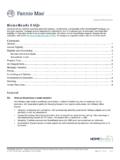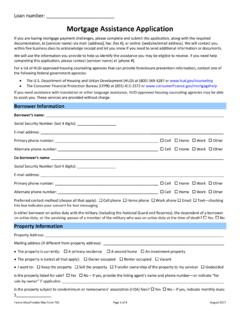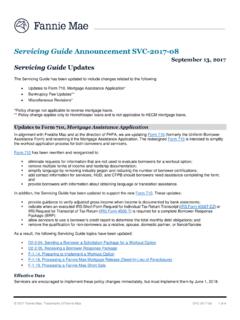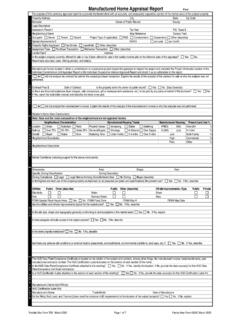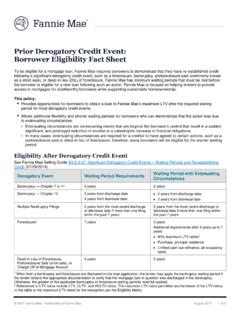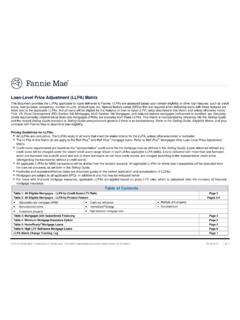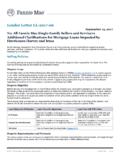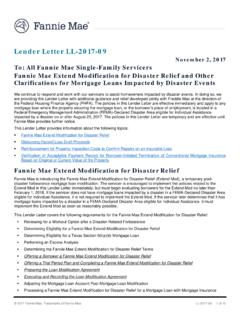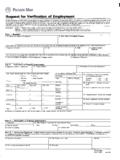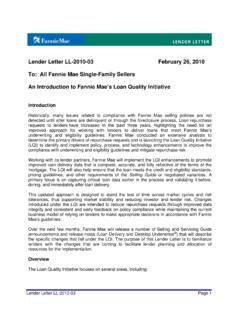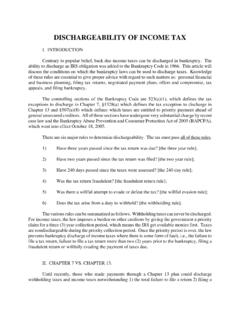Transcription of Borrower Income Verification Policies Frequently …
1 Borrower Income Verification Policies Frequently Asked Questions This document addresses Frequently asked questions about fannie Mae's Policies regarding Verification of Borrower Income (Selling Guide B3-3), including updates in Selling Guide Announcement SEL-2014-16 and Announcement SEL- 2015-07. For related information, refer to the IRS Form 4506-T Tips for Underwriting and Quality Control. For details on Income Verification for loans with Income validated through the DU Validation Service, refer to the DU Validation Service FAQs. Q1. When does fannie Mae require that borrowers complete and sign IRS Form 4506-T, and when is the lender required to obtain tax transcripts from the IRS? The IRS Request for Transcript of Tax Return (IRS Form 4506-T) gives the lender permission from the Borrower to obtain tax transcripts from the IRS. fannie Mae requires that lenders obtain a completed and signed IRS Form 4506-T from all borrowers during the underwriting process, EXCEPT that this requirement does not apply if all of the Borrower 's Income has been validated by the DU validation service.
2 This aligns with the Selling Guide policy that does not require lenders to obtain tax transcripts as part of the quality control process in these cases. If all Borrower Income is not validated through the DU validation service, the lender must obtain the completed and signed IRS Form 4506-T. The lender has the discretion to determine at what point in the process it is obtained, understanding that the form is only valid for 120 days from the date of the Borrower 's completion/signature. Some lenders may submit the Form 4506-T to the IRS to document Borrower Income , but the intent of this policy is to validate the Income documentation provided by the Borrower and used in the underwriting process. fannie Mae does not require lenders to obtain tax transcripts from the IRS prior to closing, but does require that it be included as part of the lender's post-closing quality control processes, unless all Borrower Income has been validated through the DU validation service.
3 If the lender chooses to obtain tax transcripts from the IRS prior to closing, the transcripts received must be used to validate the Income documentation used in the underwriting process. Q2. Why does fannie Mae permit lenders to request specific or limited documentation from the IRS when submitting a request with the Borrower 's consent on IRS Form 4506-T (such as requesting only the transcript for forms W2 or 1099), rather than always requiring the full transcript of the Borrower 's personal Income tax return (aka Form 1040)? fannie Mae's requirements for documentation to be requested from the IRS align with the Income documentation required at origination. Only when the Borrower 's federal Income tax returns are required in the underwriting process, per the Selling Guide, does fannie Mae require the lender to request federal Income tax return transcripts. Federal tax returns are not required to verify Income for a significant number of Income types including salary/base pay, bonus and overtime, or commission earnings that amount to less than 25% of total qualifying Income .
4 Tax returns are also not required for military Income , Social Security disability, or 2017 fannie Mae. Trademarks of fannie Mae. May 2017 1 of 3. retirement. These Income types can be fully verified through more efficient means, such as paystubs and W2 forms. It would be a significant change to require all salaried borrowers to submit their full tax returns so that lenders could check whether each salaried Borrower does or does not report other losses such as rental, hobby self-employment, or non-reimbursed employee expenses. Q3. When does fannie Mae require federal Income tax returns to document Income ? fannie Mae requires that federal Income tax returns be provided when one or more of the following Income sources are being used to qualify: Commission earnings that amount to 25% or more of the Borrower 's total employment Income ;. Employment by family member(s) or an interested party to the purchase transaction.
5 Rental Income from an investment property (if acquired prior to the most recent tax filing);. Income from temporary or sporadic employment (for example, seasonal Income );. Income reported on IRS Form 1099 (for example, capital gains, royalties);. Income earned from a foreign corporation or foreign government and paid in foreign currency;. Income earned that cannot otherwise be verified by an independent and knowledgeable source;. Income from interest and dividends;. Income from self-employment (defined as a 25% or more ownership in the business);. Income reported to the Borrower on schedule K-1 (regardless of percentage of ownership). In these cases, the tax returns provide the underwriter with a more comprehensive view of the Borrower 's Income , and enable identification of any related expenses that may need to be factored into the Income calculation. For a complete list of Income sources and required documentation, please refer to B3-3 Income Assessment in the Selling Guide.
6 Q4. fannie Mae does not require lenders to prepare a written evaluation of self-employment Income when the Borrower is qualified using only Income that is not derived from self-employment. Does that allow lenders to disregard business losses that borrowers may be reporting for tax filing purposes outside of their employment? fannie Mae does not require lenders to review or document Income from secondary sources when that Income is not needed to qualify. Business-related debt for which the Borrower or co- Borrower is personally obligated would likely be on their credit report and therefore already included in the debt-to- Income ratio. As a practical consideration, borrowers with a primary source of Income that is not derived from self- employment and is sufficient to cover the obligation have more flexibility and could discontinue a secondary self-employment activity should it prove unprofitable.
7 Consequently, it is our view that if the Income not derived from self-employment is sufficient to qualify the Borrower , no further inquiry regarding any secondary business losses is required. The provisions of the Truth in Lending Act's Ability to Repay (ATR) provisions require Verification of the amounts of Income , assets, or debt obligations that the creditor relies on to determine a Borrower 's ability to repay using third-party records that provide reasonably reliable evidence of the Borrower 's Income or 2017 fannie Mae. Trademarks of fannie Mae. May 2017 2 of 3. assets. As a general rule, there is no ATR requirement for creditors to identify and examine losses or expenses related to Income that the Borrower does not declare as Income for the purposes of obtaining a mortgage loan. However, such expenses, to the extent the creditor is aware of them, may be relevant for the determination of residual Income , which is a concept applicable to qualified mortgages that do not qualify for safe harbor treatment ( , Higher-Priced Mortgage Loans [HPMLs]).
8 Residual Income is not an ATR requirement, but only a factor in determining whether HPMLs that are qualified mortgages can retain that status if challenged by the Borrower . Safe harbor [non-HMPL mortgages] cannot be challenged on residual Income grounds. Q5. If a Borrower isn't always required to provide IRS Form 1040, how does the lender confirm that the Borrower doesn't own rental properties that may be generating a loss? The loan application includes a section where borrowers provide details about real estate they own, any rental Income received, and information on mortgage payments and taxes, insurance, and maintenance expenses. The credit report provides a key means of identifying debt or liabilities that need to be included in qualifying the Borrower for the mortgage, including those the Borrower may not have reported during the initial loan application. Q6.
9 If a lender isn't always required to obtain the tax transcript for the Borrower 's complete Income tax return, how does the lender confirm that an employed Borrower doesn't have unreimbursed employee business expenses (reported on IRS Form 2106)? For borrowers with less than 25% of their qualifying Income coming from commissions who don't include an automobile allowance in qualifying Income , unreimbursed employee business expense are not required to be analyzed or deducted from the Borrower 's qualifying Income , or added to monthly liabilities. This applies regardless of whether unreimbursed employee business expenses are identified on tax returns (IRS Form 2106) or tax transcripts received from the IRS. If the Borrower has a significant portion (25% or more) of their Income coming from commission Income or is including an automobile allowance in qualifying Income , fannie Mae requires the Borrower 's federal Income tax returns for the most recent two years be obtained.
10 In those cases, the lender would review any non-reimbursed business expenses to determine whether expenses need to be incorporated into qualifying the Borrower for the mortgage. 2017 fannie Mae. Trademarks of fannie Mae. May 2017 3 of 3.
